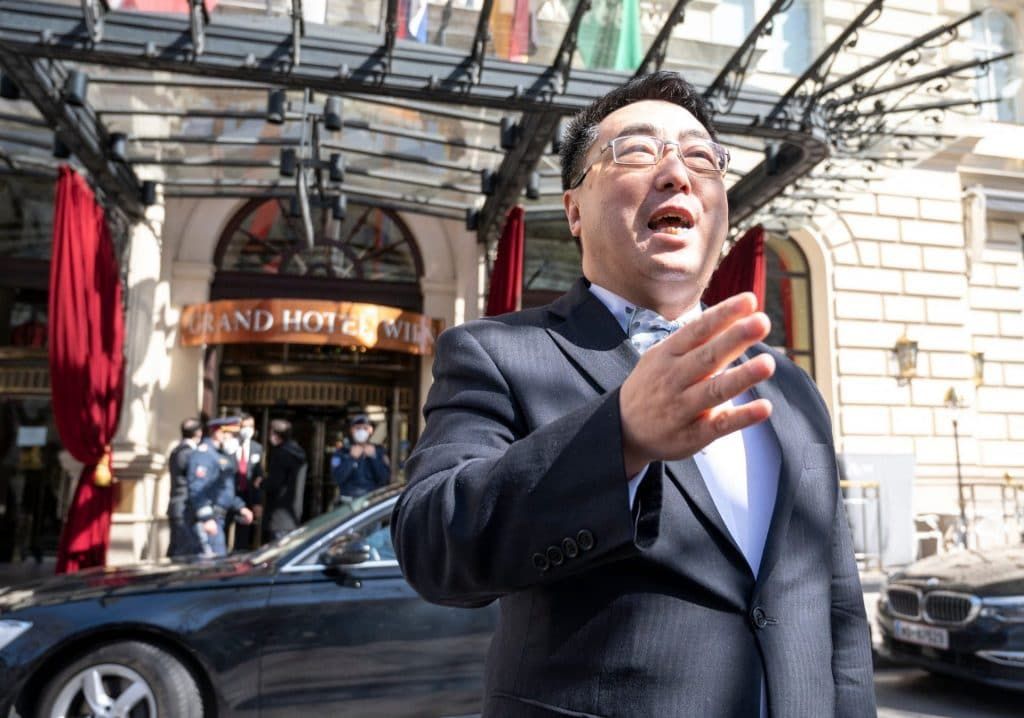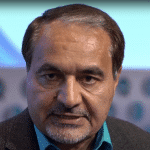Why a quick return to the Iran nuclear deal is needed to avoid a real nuclear crisis
By Seyed Hossein Mousavian | April 11, 2021
 The ambassador of the Permanent Mission of the People's Republic of China to the United Nations, Wang Qun, speaks to journalists in front of the Grand Hotel after the closed-door nuclear talks with Iran in Vienna, where diplomats of the EU, China, Russia and Iran held their talks. The United States participates in discussions in Vienna to try to save the international agreement on Iranian nuclear power. However, they don't meet at the same table as Tehran and it is the Europeans who serve as intermediaries between the two parties. (Photo by JOE KLAMAR/AFP via Getty Images)
The ambassador of the Permanent Mission of the People's Republic of China to the United Nations, Wang Qun, speaks to journalists in front of the Grand Hotel after the closed-door nuclear talks with Iran in Vienna, where diplomats of the EU, China, Russia and Iran held their talks. The United States participates in discussions in Vienna to try to save the international agreement on Iranian nuclear power. However, they don't meet at the same table as Tehran and it is the Europeans who serve as intermediaries between the two parties. (Photo by JOE KLAMAR/AFP via Getty Images)
About 80 days after President Biden’s inauguration, Iran and the world powers held the first round of nuclear talks in Vienna aimed at reviving the Iran nuclear deal known as the Joint Comprehensive Plan of Action, or JCPOA. Diplomats involved in the talks agreed on Friday that initial steps in two working groups designed to bring both the United States and Iran back into compliance with JCPOA were positive and would continue next week.
Still, the Biden administration will need to maneuver around multiple political obstacles if it is to rejoin the nuclear deal in a timely fashion. And if the United States does not quickly rejoin, there is a real possibility that the talks will collapse, that Iran will proceed with its uranium-enrichment program, and that a dangerous crisis will needlessly be created.
The context of the current talks. Iran and six world powers (the United States, Russia, China, UK, Germany, and France) agreed to the JCPOA in July 2015 amid much fanfare. But in May 2018, then-President Trump withdrew the United States from that agreement and reinstated US nuclear-related sanctions on Iran. Under the JCPOA, the US had lifted those sanctions in exchange for Iran agreeing to severely limit its nuclear program and accept International Atomic Energy Agency inspections far more intrusive than those required under the Non-Proliferation Treaty.
For a full year after Trump withdrew from the deal, Iran continued its full compliance with the limitations it had agreed to in the JCPOA. Thereafter, Tehran began incrementally stepping back from those limitations, seeking to put pressure on the United States to return to the agreement. In January, Biden’s nominee for Secretary of State, Anthony Blinken, said the “breakout time” in which Iran could produce enough highly enriched uranium for a bomb “has gone from beyond a year (under the deal) to about three or four months.” In September, Biden himself wrote, “Trump recklessly tossed away a policy that was working to keep America safe.”
Now, about three months after taking office, the Biden administration still has not rejoined the deal. There appear to be three principal obstacles to a quick US re-entry:
First, the administration is divided. According to Foreign Policy magazine, the Biden administration’s negotiator with Iran, Robert Malley, and Deputy National Security Advisor Jonathan Finer are in favor of rejoining, but Secretary of State Blinken and National Security Advisor Jake Sullivan favor a harder line.
Second, the powerful pro-Israel lobby has joined in pressing the Biden administration not to rejoin the JCPOA.
Third, congressional Democrats are divided. In two separate letters to Blinken, bipartisan groups of about 160 members of the House have called for continued pressure on Iran. The chair of the Senate Foreign Relations Committee, Sen. Bob Menendez of New Jersey, opposes revival of the JCPOA in its current form. In a statement, Republican Sen. James Inhofe of Oklahoma warned, “As a reminder: Members of Congress rejected the JCPOA on a bipartisan basis in 2015. If you (Biden) repeat history next week by restoring that failed agreement, we will work to reject it once again.”
For the United States to return to the JCPOA as it was, the Biden administration would have to engage in rigorous work, lifting about 1,600 sanctions and punitive designations that the Trump administration imposed on Iran after then-President Trump pulled out of the deal in 2018. The Biden administration has already warned that it will not lift every single economic sanction that former President Donald Trump imposed. Therefore, although Washington and Tehran say they want “compliance for compliance” deal to revive the JCPOA, a big question remains: Can Biden deliver full US compliance?
I have been involved in Iran nuclear talks for about two decades. Based on my experience and understanding of the current political situations in Teheran and Washington, absent a quick decision by Biden to rejoin the JCPOA, the agreement will totally collapse, and serious nuclear talks will not take place again until Iran gains new leverage by ramping its nuclear program back up to pre-JCPOA levels—or perhaps even beyond.
A new confrontation and the possibility of a new crisis. Historically, US pressure tactics have backfired, pushing Iran ever closer to nuclear-weapon acquisition.
As detailed in my book, The Iranian Nuclear Crisis, after the 1979 Iranian Revolution, Iran decided to cancel most of the Shah’s ambitious nuclear and military projects, retaining only the Tehran Research Reactor that the United States had provided the Shah in 1967 and the Bushehr nuclear power plant, which had been 90 percent completed by Germany. Iran contracted with France to enrich uranium to fuel the Bushehr reactor, making a national enrichment facility unnecessary. Angered by the hostage crisis, however, the United States pressed France and Germany to renege on their contracts with Iran, in clear violation of Non-Proliferation Treaty, which guarantees members access to peaceful nuclear technology, Germany and France buckled and withdrew.
After 15 years of failed nuclear talks with France and Germany, in 1995 Iran decided to produce its own nuclear fuel. In 2003, the world learned that Iran was building a uranium enrichment plant. The US responded by shifting from a no-nuclear-technology policy to a focus on a no-enrichment policy for Iran. France, Germany, and the UK began nuclear talks with Iran in September 2003 but, as then UK Foreign Minister Jack Straw has reported, the talks foundered because the US insisted that Iran must not have uranium enrichment facilities on its own soil in any circumstances, and the European countries gave in to the pressure. Between 2003 and 2013, the United States persuaded China, France, Russia and the United Kingdom—the four other permanent members of UN Security Council—to back six resolutions imposing tough international sanctions on Iran.
Former Secretary of State John Kerry recounted last year that, “[i]n 2013, I sat down with Mohammad Javad Zarif, Iran’s foreign minister, for the first meeting between our countries’ top diplomats since the 1979 revolution and hostage crisis. Iran at the time had enough enriched material for eight to 10 nuclear bombs and was two to three months from being able to build one.” Washington was forced to shift its policy from no enrichment to no breakout. This policy was consistent with the Non-Proliferation Treaty, and the JCPOA was signed in July 2015.
Now we have a new confrontation. On December 2, in retaliation for the Trump administration’s reimposition of sanctions, Iran’s hardline Parliament passed legislation requiring that Iran’s Atomic Energy Organization begin enriching uranium to 20 percent of the U-235 isotope, the internationally- designated boundary above which uranium becomes weapon-usable.
The Parliament also withdrew Iran from the IAEA’s Additional Protocol, which allows IAEA inspections at sites such that where Iran produces gas centrifuges for uranium enrichment. If the United States continues to refuse to rejoin the JCPOA and lift its sanctions on Iran, the legislation required Iran to begin to operate advanced centrifuges, to develop the capability to convert uranium into metal form, such as would be used in a nuclear weapon, by this month, and to greatly increase the number of Iran’s operating centrifuges. The legislation also dictates that Iran’s 40-megawatt Arak heavy-water reactor be brought into operation within one year.
So far, the Biden administration’s response has been unfortunate. Secretary of State Blinken has said that there will be no American concessions until Iran returns to full compliance with the JCPOA, and, on March 11, 2021, National Security Advisor Jake Sullivan and his Israeli counterpart, Meir Ben-Shabbat, expressed their common determination to confront Iran.
It therefore now appears in the absence of US return to the JCPOA, Iran will produce enough enriched uranium within the next three to six months to put itself in a position to be able to break out and quickly to enrich enough 90 percent-enriched uranium for a bomb. Iran’s Supreme Leader, Ayatollah Ali Khamenei, has frequently reiterated that producing and stockpiling nuclear weapons is absolutely forbidden in Iran according to the rules of Islam. But he has also stated that Iran will never yield to US pressure over its nuclear activities and might enrich uranium up to 60 percent. This last level appears to be a reference to Iran’s previous expressed interest in developing a nuclear reactor similar to US naval reactors that powering ships.
If Iran continues on this path, it seems likely that the United States and Israel will respond by intensifying the strategies they have followed since 2005: sanctions, sabotage of Iran’s nuclear facilities, and perhaps even assassinations of more Iranian nuclear scientists.
Based on the experience of the past four decades, Iran will be able to resist these confrontational policies and carry through to a breakout position. In response, after the inauguration of Iran’s new and probably hardline president in August 2021, the US policy will have to shift from a policy of no breakout to one of no nuclear bomb. At that point, to resolve the crisis peacefully, new nuclear talks would be required, and the US would have to make enough concessions to convince Iran not to pursue a nuclear bomb.
It would be far better to avoid such a dangerous crisis by returning to President Biden’s original plan for the US to quickly rejoin the JCPOA and raze the sanctions that President Trump imposed in exchange for Iran coming back into full compliance with the agreement. Then, the two countries could begin to negotiate on the other issues that divide them.
Together, we make the world safer.
The Bulletin elevates expert voices above the noise. But as an independent nonprofit organization, our operations depend on the support of readers like you. Help us continue to deliver quality journalism that holds leaders accountable. Your support of our work at any level is important. In return, we promise our coverage will be understandable, influential, vigilant, solution-oriented, and fair-minded. Together we can make a difference.
Keywords: Additional Protocol, IAEA, Iran nuclear deal, JCPOA, NPT, joint comprehensive plan of action, uranium enrichment
Topics: Nuclear Risk, Nuclear Weapons
















“ Iran’s Supreme Leader, Ayatollah Ali Khamenei, has frequently reiterated that producing and stockpiling nuclear weapons is absolutely forbidden in Iran according to the rules of Islam.” But if this is the case, why does Iran need to enrich uranium at all? If they genuinely do not want nuclear weapons, they should be more than willing to roll back any violations of the JCPOA, to allow US lifting of sanctions – they gain nothing by sustaining or expanding enrichment if they don’t seek nukes – they gain by seeing those sanctions removed. They should also be willing to negotiate a new agreement that… Read more »